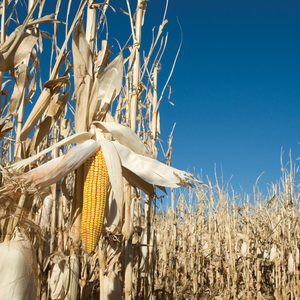USDA maintains forecast for corn use in ethanol

November 9, 2022
BY Erin Krueger
The USDA maintained its forecast for 2022-’23 corn use in ethanol in its latest World Agricultural Supply and Demand Estimates report, released Nov. 9. The forecasts for corn production and ending stocks were raised.
Corn production is forecast at 13.93 billion bushels, up 35 million from last month on a 0.4-bushel increase in yield to 172.3 bushels per acre. Feed and residual use is revised higher based on a larger crop. With supply rising more than use, corn ending stocks are raised 10 million bushels. The season-average corn price received by producers is unchanged at $6.80 per bushel.
Advertisement
Advertisement
The USDA maintained its forecast for 2022-’23 corn use in ethanol at 5.275 billion bushels. The estimate for 2021-’22 corn use in ethanol was revised down slightly, from 5.328 billion bushels last month to 5.326 billion bushels. Corn use in ethanol for 2020-'21 was at 5.028 billion bushels.
Foreign corn production is forecast lower with declines for the European Union, South Africa, Philippines and Nigeria partly offset by increases for Angola, Mali, Pakistan, Turkey and Senegal. Corn production in the EU is down based on a decline for Hungary. South Africa is reduced based on lower expected area.
Advertisement
Advertisement
Major global trade changes include lower corn exports for South Africa. Corn imports are reduced for Vietnam, Algeria and Turkey. For 2021-’22, corn exports for Argentina are cut for the local marketing year beginning March 2022, based on shipments observed through October. Foreign corn ending stocks are down, mostly reflecting declines for Nigeria and South Africa that are partly offset by an increase for Vietnam. Global corn ending stocks at 300.8 million tons, are down 400,000 tons.
Related Stories
The U.S. EPA on July 8 hosted virtual public hearing to gather input on the agency’s recently released proposed rule to set 2026 and 2027 RFS RVOs. Members of the biofuel industry were among those to offer testimony during the event.
The USDA’s Risk Management Agency is implementing multiple changes to the Camelina pilot insurance program for the 2026 and succeeding crop years. The changes will expand coverage options and provide greater flexibility for producers.
The USDA’s National Agricultural Statistics Service on June 30 released its annual Acreage report, estimating that 83.4 million acres of soybeans have been planted in the U.S. this year, down 4% when compared to 2024.
SAF Magazine and the Commercial Aviation Alternative Fuels Initiative announced the preliminary agenda for the North American SAF Conference and Expo, being held Sept. 22-24 at the Minneapolis Convention Center in Minneapolis, Minnesota.
Scientists at ORNL have developed a first-ever method of detecting ribonucleic acid, or RNA, inside plant cells using a technique that results in a visible fluorescent signal. The technology could help develop hardier bioenergy and food crops.
Upcoming Events










